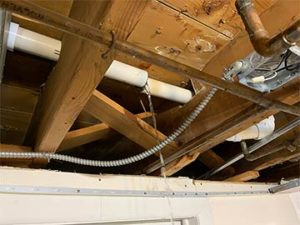 At least one in every four homes experience water leaks. Burst pipes and water leaks are not uncommon. Whether you own the home or rent it, you should expect leaks.
At least one in every four homes experience water leaks. Burst pipes and water leaks are not uncommon. Whether you own the home or rent it, you should expect leaks.
You cannot avoid all instances of water leaks. However, you can put up measures to reduce the extent of damage to your property and your expenses. Some leaks are very obvious. You can either see them or hear the dripping sound of water.
However, other forms of leaks may not be so apparent. They can occur quietly and you only notice them when they have caused serious damage to the property. That is why it is essential to detect leaks early. In this article, we will discuss how you can detect water leaks in your house even when it is hidden.
HOW TO DETECT WATER LEAKS IN YOUR HOME
- A drop in water pressure
There are two ways you can check for the water pressure in your home. One is by using a pressure gauge. The second one is by observing the water flow rate. If you are using a pressure gauge, the reading should be between 40 to 70 psi. You should only take the reading when you turn off all the running water in your house. If you have any value below 40 psi, then your water pressure is low.
The second method is by observing the water pressure when taking a shower or filling a bath. Note if there is a drop in the pressure. Then turn off all your water fixtures and let only one stay on. If there is an increase in the flow rate when only one water source is on, you should suspect leaks.
Note that there may be other causes of low pressure in your showers such as a faulty shower/bath diverter or limescale build-up causing a clogged showerhead.
- An increase in water usage and water bill
If you notice any sudden increase in your water usage and bill, it is essential to identify the cause. Sometimes it may be because you are watering your lawn/garden more or the presence of visitors in your home. But if there is no apparent change in your activities that will warrant an increase in water bills, then you should suspect a leak.
You can subscribe or ask your water supplier for a monthly statement of your water usage. Doing so will help you to monitor changes in your water usage.
- The hot water boiler/heater is constantly on
Monitor your water boiler. If you notice that it is turned on most of the time, you should suspect an underground leak. Underground leaks are hidden leaks that may be harder to locate when compared to others. Don’t expect to see any visible signs on your ceiling here. Instead, check for damp patches or pools of water on the floor.
Underground leaks may take longer to manifest. You may not have to wait for the clues. Instead, use a leak detection tool to monitor hot water as it travels through the pipes. Doing so will save you more time and money.
HOW TO DETECT WATER LEAKS OUTSIDE OR IN THE LAWN
If there are no visible signs of leaks indoor or outside, you can assess this further. To do this, you will have to check your water meter. Turn off the stop tap to cut the water supply into your house. Check if the water supply is off by running a tap inside the house until no water flows through it. Observe your water meter if it is still moving. If the water meter is moving, then the leak is outside or in the garden.
When you confirm that the leak is outside, look for signs to locate the source. That may include muddy patches or the plants around that area are growing better than the ones in other regions of your garden. Your plumber can help you assess the extent of the leak and also repair it. Sometimes the leaks may be under concrete. In that case, you wouldn’t be able to see these signs and may require a sewer line repair. Here, you may notice the smell of mold or mildew, damp patches on the floor, cracks on the concrete, or uneven surfaces.
WHAT TO DO WHEN YOU DETECT A LEAK
When you detect a leak in your home, it is necessary to assess the severity and extent of the damage. If the leaks are severe or have the potential of getting worse, call a plumber immediately. Remember to turn off the water supply into your home to prevent water damage. In addition, turn off the electricity supply to the area of the house experiencing a leak.
THE BOTTOM LINE
Early detection of a leak is the best way to prevent water damage to your property. Get a plumber to perform routine inspection and maintenance of your plumbing system. Once they notice components that are prone to leaks, they will fix them before leaks occur.
Comments
Post a Comment